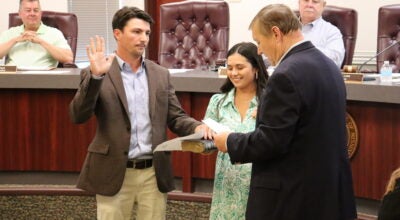Nicholson Elementary named state winner for STEM project
Published 7:00 am Saturday, January 24, 2015

REAL-WORLD SOLUTIONS: Nicholson Elementary teacher Maureen Pollitz works with several of her sixth-graders on a STEM project. They will compete in the next round of competitions for the 2015 Samsung Solve for Tomorrow contest. Photo courtesy of Maureen Pollitz.
Nicholson Elementary has a reason to celebrate after being named the state winner for the 2015 Samsung Solve for Tomorrow contest in December.
It all started after Nicholson Elementary teacher Maureen Pollitz wrote a lesson plan to use science, technology, engineering and math to analyze the engineering design process and apply it to the real world.
She entered the competition for the first time after Patrick Rutherford, principal for Nicholson Elementary, encouraged her to submit her lesson plan.
“I’m just so thrilled to be a state winner,” Pollitz said.
According to a press release from Samsung Solve for Tomorrow, the contest is “a nationwide competition to increase interest in science, technology, engineering and math by challenging teachers and students to take topics out of traditional classroom settings and into local communities.”
This is Nicholson’s first time as a state winner in this contest, and they have prizes to show for it. The school won $20,000 worth of Samsung technology, including Adobe Elements software, laptop and a camera, the press release also stated.
But Pollitz said the competition isn’t over yet. Now, she’s working alongside several of her gifted sixth grade students and high school students from the Pearl River County robotics team to get ready for the next round, which will be a nationwide competition.
For the next stage, Pollitz and the students will work on creating a two to three minute video that will document how they’re using the lesson plan in a real-life situation.
Pollitz said her sixth graders are really involved in the project.
“They’ve gone through the process of looking over the lesson plan, and meeting with the public works director in order to solve a problem with the city. They were able to successfully identify a solution to the problem,” Pollitz said.
Both the sixth grade students and high school students are working on their own plans for the project.
“Some of the ideas that they [sixth graders] came up with are very similar to what the high school students came up with,” Pollitz said proudly.
Once Pollitz and the students compare their plans, they will choose the best one, and submit it to the national competition before the Feb. 13 deadline.
“We’ll definitely be working a lot after school,” Pollitz said. But she added that it’s worth the time.




